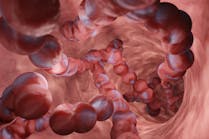Frozen embryo transfers in IVF linked to greater risk of maternal hypertension in pregnancy
Concerns have been raised over the past few years that pregnancies derived from frozen embryo transfers in IVF might increase the maternal risk of hypertensive disorders, particularly pre-eclampsia, complications which may have severe consequences for the mother and fetus. These concerns have been raised in recent studies comparing the outcomes of fresh and frozen transfers, according to a news release.
The fast-freezing technique of vitrification has proved a game-changer in assisted reproduction in the past ten years. Its efficiency and reliability have encouraged single embryo transfers (and thus a marked reduction in risk of multiple pregnancies), the safe storage of supernumerary embryos, and, through transferring embryos in a later (non-stimulated cycle), a reduction in the risk of ovarian hyperstimulation syndrome in pregnancy. Around 50% of all ART transfers are now FET, many of them ‘freeze-all’ in which every embryo generated in a stimulated cycle is stored for later transfer.
A large study based on real-life registry data and a comparison of maternal complications in sibling pregnancies indicate that pregnancies following frozen embryo transfer (FET) do indeed have a substantially higher risk of hypertensive disorders than naturally conceived pregnancies. This same raised risk (roughly doubled) was also found in a sub-group analysis of sibling births, which was designed to eliminate the effect of any parental factors in the results.
‘Our findings are important because the number of FETs is rapidly increasing throughout the world,’ said the study’s first author Sindre H. Petersen from the Norwegian University of Science and Technology, Trondheim, Norway.
According to the latest registry report from ESHRE, the proportion of FET cycles relative to fresh is still on the rise in Europe. In 2017 the proportion was 49%, against 38% in 2014. Similar trends are present in the US and most high-income countries. FETs are increasingly common because of improved cryopreservation methods, facilitation of single embryo transfer, reduction of ovarian hyperstimulation, and the elective freezing of all embryos (‘freeze-all’ cycles).
The study analyzed more than 4.5 million singleton pregnancies in the registries of three Nordic countries with delivery between 1988 and 2015. Of the conceptions following assisted reproduction, 78,300 were after fresh embryo transfer and 18,037 were after FET. The registry birth references – largely unique to the Nordic countries – also allowed the identification of 33,209 sibling deliveries following either fresh or frozen embryo transfer, and natural conception. This study was by far the largest sibling analysis to date investigating the association between assisted reproduction treatments and hypertensive disorders in pregnancy,’ said Dr Petersen.
Results of the study showed that the risk of hypertensive disorders in pregnancy were almost twice as high in the pregnancies following FET than in pregnancies following a natural conception (7.4% vs 4.3%). However, the risk of hypertensive disorders in pregnancies following fresh embryo transfer pregnancies was comparable to naturally conceived pregnancies. Adjustments for maternal body mass index, smoking and time between deliveries did not affect the end results, nor did other methods of assisted reproduction (IVF, ICSI, duration of embryo culture or number of embryos transferred).
Hypertensive disorders in pregnancy comprise gestational hypertension and pre-eclampsia, and the more rare but severe conditions of eclampsia and Hemolysis-Elevated-Liver-enzymes-Low-Platelets (HELLP) syndrome.





